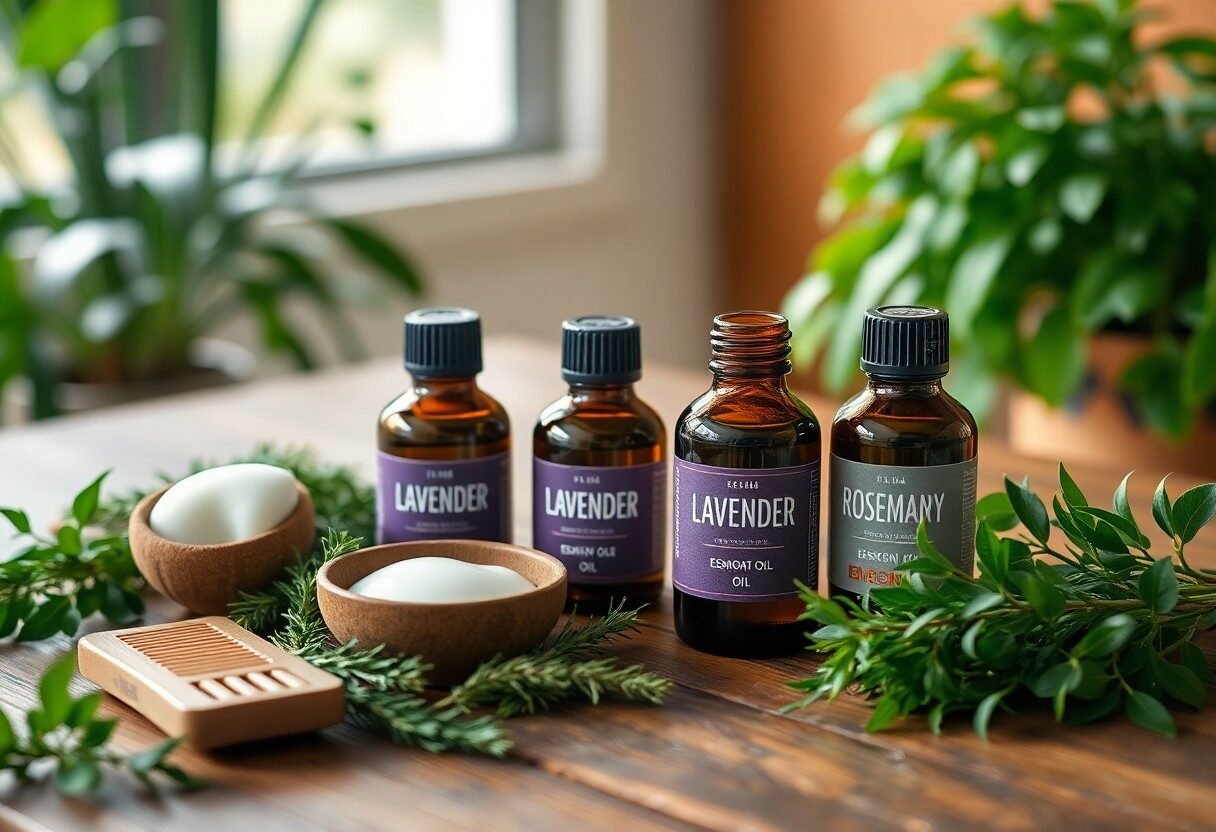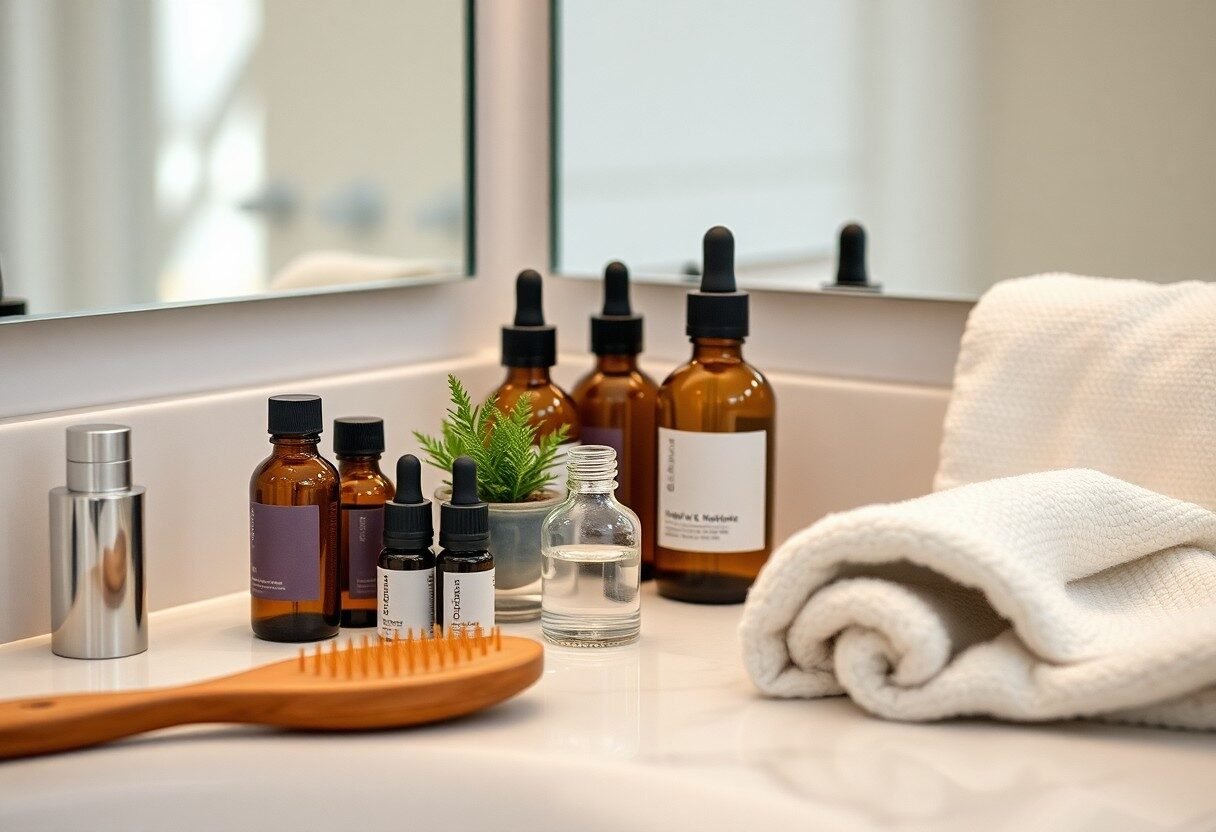
Just as the right ingredients can elevate your cooking, important oils can significantly enhance your hair care routine. I’ve discovered that these potent plant extracts can not only nourish your scalp but also strengthen hair strands, addressing issues like dryness and thinning. By harnessing the natural benefits of oils like rosemary and lavender, you can promote a healthier environment for hair growth and achieve a shine that transforms your locks. Join me as I investigate into how incorporating important oils into your regimen can lead to vibrant, thriving hair.
Key Takeaways:
- Essential oils can nourish the scalp, promoting a healthier environment for hair growth.
- Some vital oils, such as lavender and rosemary, have been shown to stimulate hair follicles and may help prevent hair loss.
- Using vital oils can enhance your hair’s natural shine and texture, improving overall appearance.
- Incorporating vital oils into your hair care routine can help address issues such as dandruff and dryness.
- Essential oils can provide a soothing effect, reducing scalp irritation and promoting relaxation during grooming.
- When using vital oils, dilution with carrier oils is important to avoid irritation and ensure safe application.
- Different oils may target specific hair concerns, so it’s beneficial to choose vital oils based on individual hair needs.
Nature’s Powerhouses: The Chemistry of Essential Oils
The complex chemistry of important oils is what makes them so effective for hair health. Each oil consists of a unique blend of volatile compounds, known as terpenes and terpenoids, that contribute to its therapeutic properties. These natural constituents not only deliver delightful scents but also provide myriad benefits such as antimicrobial action, anti-inflammatory effects, and antioxidant properties. Understanding the composition of these oils enhances your ability to harness their potential for revitalizing your hair and scalp.
Key Components of Essential Oils
Essential oils are composed of various key components, such as linalool, geraniol, and eucalyptol, which offer distinct properties that contribute to hair care. For instance, linalool, commonly found in lavender oil, has been shown to promote relaxation and reduce stress, while geraniol, found in rose and geranium oils, assists in stimulating hair growth. These components combine synergistically, resulting in powerful concoctions that can enhance your hair’s vitality and strength.
Mechanisms of Action on Hair Health
Essential oils act on hair health through various mechanisms, such as improving blood circulation at the scalp level, nourishing hair follicles, and balancing scalp oil production. For instance, peppermint oil’s menthol helps to invigorate and stimulate blood flow, encouraging stronger hair growth. Likewise, tea tree oil possesses antifungal properties that can combat dandruff, creating a healthier scalp environment conducive to hair growth. These actions contribute to an overall boost in hair condition and appearance.
Delving deeper into the mechanisms of action, important oils like rosemary and cedarwood have been studied for their ability to inhibit dihydrotestosterone (DHT), a hormone linked to hair thinning and loss. By naturally regulating hormone levels, these oils can effectively combat common forms of hair loss. Moreover, important oils promote hydration, sealing moisture into the hair shaft, which helps to reduce breakage and improve elasticity. By incorporating important oils into your hair care regimen, you’re not just masking problems but addressing the root causes of hair health, ultimately resulting in stronger and more beautiful hair.
Vital Oils for Luxurious Locks: The Top Players
In the context of nurturing your hair, certain vital oils stand out for their remarkable benefits. I’ve discovered that oils like lavender, peppermint, and rosemary play a pivotal role in promoting healthy, beautiful hair. Each of these oils brings unique properties that address various hair concerns while encouraging a luscious mane.
Lavender for Calmness and Growth
Lavender oil is renowned for its calming properties, which extend to hair health by reducing stress and promoting hair growth. I find that this oil not only soothes the scalp but also can help in creating a pristine environment for follicles to thrive. Studies indicate that lavender oil may even promote hair growth cycles, making it a delightful addition to my hair care routine.
Peppermint for Stimulation and Dandruff Control
Peppermint oil provides a refreshing boost while combating dandruff. The menthol component in peppermint invigorates the scalp, stimulating blood circulation, which helps with hair growth. This invigorating oil can also help to alleviate dryness and itchiness, allowing your scalp to breathe and thrive.
Incorporating peppermint oil into your regimen not only refreshes your senses, but also works wonders for scalp health. When I add a few drops to my shampoo or conditioner, I feel a tingle that indicates the oil is working its magic. Its antifungal, antibacterial, and anti-inflammatory properties combat dandruff effectively, while increased blood flow to the hair follicles enhances hair growth, making it a must-have oil for anyone dealing with stubborn flakes or a lack of growth.
Rosemary for Follicle Fortification
Rosemary oil is a powerhouse for strengthening hair follicles and preventing hair loss. I appreciate how this oil nourishes the scalp, enhancing blood circulation and delivering vital nutrients to hair roots. Its ability to balance oil production makes it suitable for all hair types and an vital part of your hair care arsenal.
This potent oil has gained recognition in studies for its effectiveness in preventing hair loss, sometimes being compared to minoxidil, a common treatment for hair thinning. By promoting circulation, rosemary oil ensures that nutrients reach the hair follicles, fostering optimal conditions for growth. In my experience, adding rosemary to my hair-care routine has made a noticeable difference in thickness and overall health, making it an invaluable oil for luxurious locks.

Crafting Your Routine: Incorporating Essential Oils Effectively
To fully harness the benefits of crucial oils for hair health, crafting a personalized routine is key. Start by identifying your specific hair concerns—be it dryness, thinning, or scalp issues. From here, I recommend selecting oils that align with your needs; for instance, if you’re dealing with dandruff, tea tree oil may work wonders, while those seeking added shine might benefit from jojoba oil. Integrating these oils into your daily regimen can transform your hair care from mundane to extraordinary.
Blending and Dilution Techniques
Blending crucial oils with carrier oils is vital for safe and effective use. Carrier oils, such as coconut or olive oil, help dilute crucial oils, reducing the risk of skin irritation. A common ratio is 15 drops of your chosen crucial oil per ounce of carrier oil. For specific hair concerns, feel free to experiment by adjusting the proportions to find the perfect blend that suits your hair type.
Application Methods for Maximum Benefit
Employing the right application methods enhances the efficacy of crucial oils on your hair. I often use a few different techniques to maximize their benefits. For example, applying the oil blend directly to the scalp using a dropper promotes scalp health, while massaging the oil through the lengths of my hair helps with moisture and shine. I also recommend incorporating oils into your regular shampoo or conditioner to infuse your hair care routine with the nourishing properties of these oils.
To ensure each application is beneficial, I typically section my hair hair and focus on the scalp first; this not only allows for better absorption but also increases blood circulation, which can promote hair growth. After massaging the oil into my scalp, I distribute the remaining mixture along the strands. Leaving it on for at least 30 minutes before rinsing can enhance its effectiveness. I sometimes even opt for a warm towel wrap to create a spa-like treatment at home, which helps to lock in moisture and promote deeper penetration of the oils.
Addressing Common Concerns: Myths and Misunderstandings
Essential oils in hair care often attract a plethora of misconceptions. Many people believe that they can solely replace all chemical treatments, while others are wary due to myths about potential side effects. However, it’s crucial to understand that these natural oils can be powerful allies when combined with a balanced hair care routine, rather than standalone solutions.
Essential Oils vs. Chemical Treatments
Some people view crucial oils as mere alternatives to chemical treatments, but that oversimplifies their role. While chemical treatments can offer immediate and tough solutions, crucial oils promote longer-term hair health. They nourish the scalp and stimulate hair growth while avoiding harsh synthetic ingredients often found in commercial products.
Safety Precautions and Allergic Reactions
Despite their natural origins, crucial oils can provoke allergic reactions in some individuals. Always conduct a patch test before full application, especially if you have sensitive skin. Diluting oils with carrier oils is also key to minimizing irritation. This way, you can enjoy the benefits without compromising safety.
Allergic reactions can manifest in various ways, from mild irritation to more severe symptoms like rashes or difficulty breathing. I’ve seen cases where individuals experienced reactions after applying undiluted oils directly on their scalp. To minimize risks, I recommend diluting crucial oils in a safe carrier oil, such as jojoba or coconut oil, at a ratio of about 1-2 drops of crucial oil per tablespoon of carrier oil. Additionally, always consult with a healthcare professional before starting any new regimen, especially if you have existing health concerns or conditions.
The Future of Hair Care: Trends in Natural Remedies
The shift towards natural remedies in hair care is only just beginning. As consumers seek healthier alternatives to synthetic products, I see a growing embrace of necessary oils and holistic methods. This trend is driven by an increasing awareness of the effects of harsh chemicals on both our hair and overall health. Natural solutions, such as necessary oils and plant-based ingredients, are being recognized not just for their benefits but for their ability to enhance personal care routines with sustainability in mind.
Growing Popularity of Holistic Approaches
People are increasingly gravitating towards holistic approaches that focus on the body’s innate healing capabilities. This trend signifies a collective shift in mindset; it’s not solely about external beauty but also tapping into the interconnectedness of physical and emotional well-being. With natural remedies like necessary oils, I witness individuals exploring self-care rituals that address stress, nutrition, and the overall health of their hair and scalp.
Research and Innovations in Essential Oil Usage
Innovations in necessary oils for hair care are rapidly evolving, with numerous studies demonstrating their efficacy. Researchers are investigating specific oils and their unique compounds to understand their potential in promoting hair health. For instance, studies have shown that ingredients like rosemary oil can stimulate hair growth by increasing blood circulation to the scalp. Moreover, advanced extraction techniques are allowing for higher concentrations of active compounds, ensuring that these oils are as potent as possible.
Recent advancements have also led to the development of custom blends that target specific hair concerns, such as thinning or dryness. Companies are investing in clinical trials to uncover the full benefits of necessary oils, providing evidence-based solutions that appeal to the modern consumer’s demand for transparency and effectiveness. I find it exciting that innovations in formulation technology allow for more potent, eco-friendly products, combining nature’s best offerings with scientific rigor. The future holds great promise, as more individuals embrace these cutting-edge natural solutions for their hair health needs.
Summing up
Ultimately, I believe that incorporating crucial oils into your hair care routine can significantly enhance your overall hair health. By selecting the right oils for your specific needs—whether for nourishment, strengthening, or adding shine—you can create a natural approach to hair care that supports growth and vitality. Always consider your hair type and sensitivities when choosing oils, and explore the numerous ways to integrate them into your regimen, from scalp massages to hair masks. Your hair deserves the best, and crucial oils can play a key role in achieving that.
FAQ
Q: What are crucial oils and how do they benefit hair health?
A: Essential oils are concentrated plant extracts that capture the natural fragrance and therapeutic properties of the plant. They benefit hair health by promoting scalp circulation, providing nourishment to hair follicles, and balancing oil production, leading to healthier, shinier hair. Different oils have unique properties that can address various hair concerns.
Q: Which crucial oils are best for hair growth?
A: Popular crucial oils for hair growth include rosemary oil, which stimulates blood circulation; peppermint oil, known for its refreshing properties that can invigorate the scalp; and lavender oil, which is also thought to reduce stress and promote hair growth. Other beneficial oils include cedarwood, thyme, and ylang-ylang.
Q: How can I use crucial oils to promote hair health?
A: Essential oils can be used in various ways: diluted in a carrier oil for scalp massages, added to shampoos or conditioners, or used in DIY hair masks. It’s important to dilute crucial oils with a carrier oil such as coconut or jojoba oil for safe topical application. A common ratio is 2-3 drops of crucial oil per tablespoon of carrier oil.
Q: Are there any precautions to take when using crucial oils on hair?
A: Yes, it’s crucial to conduct a patch test on a small skin area to check for allergies or sensitivities before applying crucial oils to the scalp. Additionally, avoid using undiluted oils directly on the skin, keep oils away from your eyes, and consult a healthcare professional if you are pregnant, nursing, or have specific health concerns.
Q: Can crucial oils help with dandruff or dry scalp?
A: Absolutely! Essential oils such as tea tree oil have antifungal properties that can combat dandruff, while oils like lavender and chamomile provide soothing relief for dry, itchy scalps. Incorporating these oils into your hair care routine may reduce flaking and enhance scalp health.
Q: How often should I use crucial oils for optimal hair health?
A: The frequency of use can vary based on individual hair needs, but general recommendations suggest applying crucial oils 1-2 times a week. Adjust according to how your hair and scalp respond. For example, those with oily hair may want to use oils less frequently than someone with dry hair.
Q: Can crucial oils be used effectively on all hair types?
A: Yes, crucial oils can be adapted for all hair types, including straight, curly, and textured hair. Choosing the right oil and method of application is key. For example, lighter oils may work better for fine hair, while thicker oils can benefit coarse or dry hair types. Tailoring your crucial oil use to your hair type will ensure the best results.











